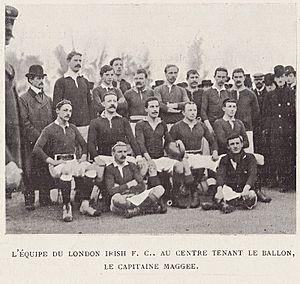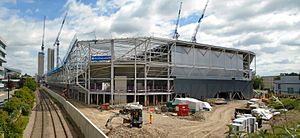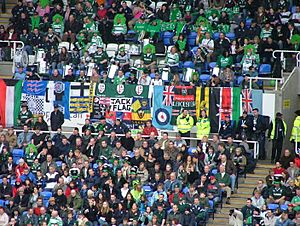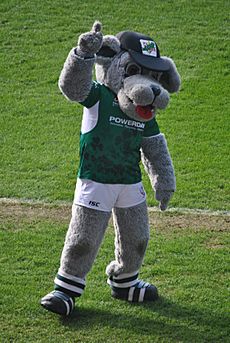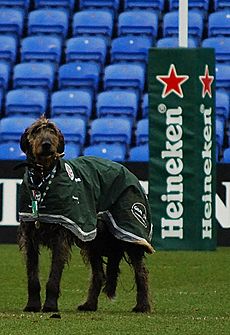London Irish facts for kids
| Full name | London Irish Rugby Football Club | |
|---|---|---|
| Union | Middlesex RFU, Surrey RFU, Irish RFU | |
| Nickname(s) | The Exiles, The Drummers | |
| Founded | 1898 | |
| Most appearances | Topsy Ojo (301) | |
| Top scorer | Barry Everitt (1,234) | |
| Most tries | Topsy Ojo (46) | |
| 2022–23 | Premiership, 5th | |
|
||
| Official website | ||
London Irish RFC is a professional rugby union club from England. They used to play in the Premiership, which is the top rugby league in England. The club also competed in big European tournaments like the European Champions Cup and the European Challenge Cup.
London Irish was started in 1898. It was created so that Irish people living in London could play rugby together. They won their biggest trophy, the Powergen Cup, in 2002. In 2009, they almost won the Premiership final but lost by just one point to Leicester Tigers. They also nearly reached the Heineken Cup Final in 2008.
Sadly, London Irish faced money problems in 2023. They were removed from all professional rugby leagues in England for the 2023–24 season. However, the club was bought by a new group of owners in February 2025. This group was led by Eddie Jordan, who used to own a Formula One racing team. The new owners plan for the club to start playing rugby again in 2026.
Contents
Club History
How London Irish Started
London Irish was the third club in England created for people from other parts of the UK living in London. London Scottish started in 1878, and London Welsh in 1885. Later, London Cornish was formed in 1962.
London Irish played their first game on October 1, 1898. They won 8–3 against the Hammersmith club. An important early player was Louis Magee, an Irish international player. He helped the team become well-known and play against other London clubs.
Challenges During Wars
The early 1900s were good for London Irish, but then World War I began. Many players joined Irish Battalions and went to fight in Europe. In 1916, after the Easter Rising in Ireland, some players went back to fight for Irish independence. Many of them did not return.
After the war, the club worked hard to rebuild. They started playing against teams outside London, like Leicester and Cardiff. But then World War II started. Players were again spread out, and many did not come back after the war. Nine players from the 1938–39 season died in the conflict. The club's home ground was even used to grow food for the war effort.
Rebuilding After the Wars
After World War II, it was tough for London Irish. Not many players returned to London, making it hard to form a team. A very cold winter in 1946–47 also meant many games were missed.
Things got better when Des O'Brien became the new captain. In 1948, London Irish celebrated its 50th anniversary with its most successful season ever. In the 1950s, the club grew strong. In 1951, they were the first club to host an Italian team, Roma. In 1959, London Irish returned to their home ground in Sunbury, called The Avenue. They had an amazing season, not losing any games.
The 1960s had mixed results, but the team improved. By the 1970s, London Irish became a very strong team. They finished first in the London Division in the 1976–77 season. They also made history in 1977 by being the first touring team to play against mixed-race teams in South Africa.
The Professional Rugby Era
Since rugby became professional in 1995, London Irish has won one major trophy. They won the Powergen Cup in 2002, beating Northampton 38–7 at Twickenham. About 75,000 people watched this game, which was one of the club's best days. In 2006, they reached the final of the European Challenge Cup but lost a close game to Gloucester.
In 2013, a group led by Mick Crossan took over the club. His company, Powerday, became a main sponsor.
In May 2023, London Irish faced serious financial problems. They had not paid their players and staff. The RFU (Rugby Football Union) gave them a deadline to find new owners or prove they had enough money. The club could not meet the deadline. On June 2, 2023, they were forced out of business due to unpaid taxes.
New Beginnings: 2024 Onwards
In October 2024, news spread that Irish businessman Eddie Jordan was forming a group to buy London Irish. He wanted to help the club become successful again.
In February 2025, Eddie Jordan's group successfully bought London Irish. They announced plans for the club to play rugby again by 2026. They are open to returning to the Premiership or joining another league. In March 2025, the group also shared plans to build a new home ground in West London. They also want to start a women's team and a youth academy.
Sadly, Eddie Jordan passed away the week after these plans were announced. His son, Kyle Jordan, became the interim leader of the club. He confirmed that the plans for the club's return in 2026 would continue.
Youth Academy
London Irish had its own academy to train young players. Many talented players came from this academy. Some of them, like Tom Homer, Nick Kennedy, Topsy Ojo, Anthony Watson, and Jonathan Joseph, went on to play for the main team and even for their national countries. Topsy Ojo played 301 games for the club before he retired.
Home Stadiums
Since the 2020–21 season, London Irish has played at the Gtech Community Stadium in Brentford, West London. This stadium is also home to Brentford F.C., a football club. It can hold 17,250 fans.
Before 2020, London Irish played at the Madejski Stadium in Reading, Berkshire for twenty years. They moved there in 2000. When the 2019–20 season was stopped due to the COVID-19 pandemic, London Irish could not return to Reading. They played their remaining games at Harlequin's Twickenham Stoop.
The biggest crowd for a London Irish match was 23,790 fans. This happened on March 15, 2008, when they played against London Wasps. This was the highest attendance for a regular Premiership Rugby match for a while.
In 2016, London Irish played their first home Premiership match outside England. They traveled to the United States to play Saracens at the New York Red Bulls' Red Bull Arena in New Jersey.
The club's training ground and offices are at the Hazelwood Centre in Sunbury-on-Thames. This facility opened in 2014 and is also used by NFL teams for training.
London Irish Amateur Rugby Club
There is also a separate club called London Irish Amateur RFC. This club is for non-professional players who want to improve their rugby skills. They play at the Hazelwood Centre, the same place where the professional team trains. Some players, like Justin Bishop and Kieran Campbell, started in the amateur club and then played for the professional London Irish team.
Club Mascots
Digger the Wolfhound
Digger is an Irish wolfhound and the official mascot of London Irish. In 2003, Digger won the "Best Mascot" award in Premiership Rugby.
On April 23, 2006, Digger even ran the London Marathon to raise money for spinal research. He finished the marathon in 6 hours, 39 minutes, and 31 seconds!
Other Mascots
Digger was joined by his cousin, Duggie, starting in the 2006–07 season. Duggie is taller and slower than Digger, and he is very popular with younger children at games. Besides the mascot characters, there is also a real Irish wolfhound named Mr Doyle who attends home games. Before Mr Doyle, his great uncle, Jumbo, used to attend games.
Club Rivalries
London Irish has rivalries with other rugby clubs in the Greater London area. Their main rivals are Harlequins and Saracens. Now that London Irish has moved back to West London, these games are local derbies. The Gtech Community Stadium is less than two miles from the Twickenham Stoop, where Harlequins play. London Irish also has a friendly rivalry with London Scottish, another club for "exiles."
Club Honours
London Irish has won several important trophies and reached many finals.
Major Trophies
- RFU Championship
- Champions: (2) 2016–17, 2018–19
- Premiership Rugby Cup
- Champions: (1) 2001–02
- Surrey Cup
- Champions: (4) 1980–81, 1981–82, 1985–86, 1986–87
- Premiership Rugby Sevens Series
- Champions: (1) 2012
Finals Reached
- Premiership Rugby
- Runners–Up: (1) 2008–09
- European Challenge Cup
- Runners–Up: (1) 2005–06
- Premiership Rugby Cup
- Runners–Up: (3) 1979–80, 2021–22, 2022–23
Friendly Competitions
- Middlesex Sevens
- Champions: (1) 2009
- Cunningham Duncombe Series
- Champions: (1) 2016
Notable Former Players
Many London Irish players have represented their countries in the Rugby World Cup.
| Tournament | Players selected | England players | Other national team players |
|---|---|---|---|
| 1999 | 7 | Malcolm O'Kelly |
|
| 2003 | 0 | ||
| 2007 | 7 | Peter Richards, Mike Catt | Olivier Magne |
| 2011 | 8 | Alex Corbisiero, Delon Armitage, Shontayne Hape | Joe Ansbro |
| 2015 | 6 | Blair Cowan |
|
| 2019 | 6 | Allan Dell |
See also
 In Spanish: London Irish para niños
In Spanish: London Irish para niños
- Rugby union in London
- London Cornish
- London Scottish
- London Welsh
- Richmond
- Hazelwood
 | Isaac Myers |
 | D. Hamilton Jackson |
 | A. Philip Randolph |


